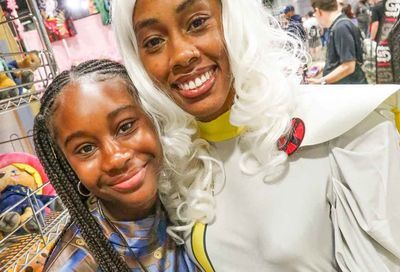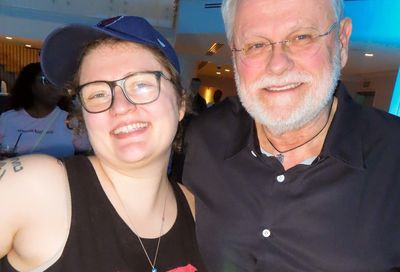Wheels in Motion
Commentary: Alphabet Soup
It’s like an amusement park for yuppies, and we’re on a ride that’s bound to induce nausea. There are so many choices, so many shiny baubles with different bells and whistles, and so many numbers behind the dollar signs.
We’re trying to buy a new car. Not a new car, but a new-to-us car, having had a moment of practicality during which we decided that a brand-new car was an unnecessary luxury. So we’re at a large, well-known used car dealership looking at our options. We have landed in Subaru land, because that’s what my partner wants. That’s what lesbians do — hence the manufacturer’s nickname of “Lesbaru.”
Our sales associate — we’ll call him “Jorge” because that is his name — is addressing all of his comments to my partner, Kim. He asked when we walked in which of us the car was for and we said it was for her. We didn’t mention that we’re both buying it. We didn’t mention that we’re partners, a.k.a. lesbian lovers, a.k.a. sodomites, depending on your point of view. (Please excuse; I have been reading too many anti-gay letters to the editor in my hometown newspaper.)
We decided, without even discussing the matter, to save that for later.
Jorge shows us Subaru station wagons and SUVs because that’s what Kim has said she wants. We have entered this purchase process with the goal of buying a car that will accommodate any family expansion that may occur in the next year or two, just in case we go through with the world’s scariest plan of having a child. So we’re looking at station wagons and SUVs, because they haul a lot of junk, and babies need a lot of junk wherever they go.
We are not baby-crazy enough to be buying a mini-van; we haven’t even decided yet exactly how we’re going to create or acquire this child. A station wagon or an SUV, that seems reasonable. A mini-van seems like a premature commitment, and might suggest that we have to start hanging up ducky wallpaper in the nursery-to-be.
At some point after the test drives and the cargo space comparison discussions, as Jorge is trying to get Kim to express a preference for the station wagon or the SUV, I’ve finally had enough.
“Jorge,” I ask him, “do you have kids?”
He tells me he does have kids, but they’re grown up. I ask if he remembers when they were little and they required lots of gear. He looks at me, puzzled, so I go in for the kill.
“We want a car that’s baby-friendly, not just safe but also roomy for all their stuff,” I tell him. “We’re planning to have kids.”
It turns out that Jorge is cool; he barely bats an eye at the new world view he has to suddenly adjust to. He tells us that he thinks either vehicle would be practical for baby-toting, so it comes down to what Kim likes the look and feel of best.
She goes for the station wagon. I remind her how years ago, when we first started talking about buying cars and having kids and growing old together, I mentioned that we might want to buy a station wagon and she told me, in very clear terms, no way no day. She told me that when she was a kid in the ’70s, her parents drove a station wagon. They took a Brady Bunch-inspired cross-country trip in that station wagon.
When she got old enough to drive, that wagon symbolized the ultimate uncoolmobile, the mascot of a childhood she was trying to outgrow. And here we stand now, Kim bypassing the hip SUV for the family-friendly wagon.
I can’t help beaming a little, because this is something of a checkmark in the “Kristina is right again” column, and then I freak out a bit as I realize that we are, in fact, growing old together right before my eyes.
Jorge leads us back into the office to start processing paperwork. At some point it occurs to me to mention that I, too, will be on the financing, so he starts taking my information, and then gets to the drop-down menu that asks what my relationship is to the co-borrower. I say, “Partner,” and he scrolls down, finds no match, and says, “Sorry, how about friend?”
Sure, we tell him. “Friend” is fine. We’re friends. Jorge and I could go buy a car together after we’re done; we’ve become friendly too. But I don’t say all of that; it’s not Jorge’s fault.
Jorge doesn’t ask what brings us car-shopping today. As far as he’s concerned, it’s a normal day on the lot. He doesn’t know we’ve just come from our insurance company and have in our possession a settlement check for the car Kim totaled.
The anti-gay screeds were right: It turns out that Massachusetts legalizing same-sex marriage can have a detrimental effect on society. In our case, the detrimental effect was Kim hearing a report on NPR, getting excited about the news, and calling home on her cell phone to rejoice in the progress up north.
When her call didn’t go through, she looked at the phone. When she looked at the phone, she failed to see a flatbed trailer jutting into the street in front of her. When she failed to see the flatbed trailer, she plowed into it without braking. She saw it for the first time when she got out of her car. Luckily the call hadn’t connected, so I didn’t have to hear this all happen. But her car got smashed up like an accordion, and she emerged with a small burn on her arm, some bruises and the knowledge that we’d be car-shopping soon.
We don’t tell all of this to Jorge. He’s still adjusting to the baby idea and the shortcomings of the relationship choices on the drop-down menu. Later, long after we’ve driven off the lot in our new station wagon, Jorge will call to see how Kim likes the car, and he’ll reach me instead. We’ll chat like the old friends we are, and he’ll tell me to have Kim call him if she has any questions or is having any problems with the new car.
Gay marriage may have destroyed Kim’s previous car, but Jorge seems OK with our manifestation of it.
Kristina Campbell lives in Takoma Park, Md. At any given time there are up to four Subarus parked on her block. “Alphabet Soup” appears biweekly and its author can be reached at kcampbell@metroweekly.com.
Support Metro Weekly’s Journalism
These are challenging times for news organizations. And yet it’s crucial we stay active and provide vital resources and information to both our local readers and the world. So won’t you please take a moment and consider supporting Metro Weekly with a membership? For as little as $5 a month, you can help ensure Metro Weekly magazine and MetroWeekly.com remain free, viable resources as we provide the best, most diverse, culturally-resonant LGBTQ coverage in both the D.C. region and around the world. Memberships come with exclusive perks and discounts, your own personal digital delivery of each week’s magazine (and an archive), access to our Member's Lounge when it launches this fall, and exclusive members-only items like Metro Weekly Membership Mugs and Tote Bags! Check out all our membership levels here and please join us today!





















